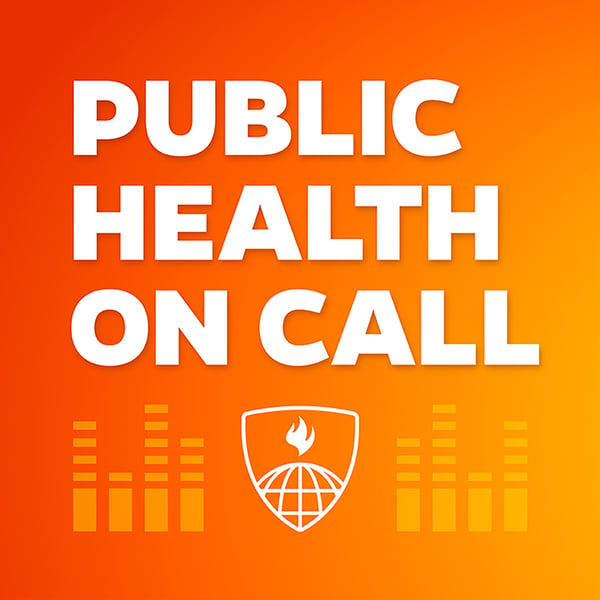870 - The Origins, Impacts, and Challenges of Misinformation
Public Health On Call
The Johns Hopkins Bloomberg School of Public Health
4.8 • 620 Ratings
🗓️ 17 March 2025
⏱️ 16 minutes
🧾️ Download transcript
Summary
About this episode:
A new report on misinformation and disinformation from the National Academies of Science, Engineering, and Medicine is helping to define what misinformation is and how it starts and how to combat it. In this episode: a conversation about the findings, and how to get away from misinformation as a name-calling contest.
Guest:
Vish Viswanath is the Lee Kum Kee Professor of Health Communication at the Harvard TH Chan School of Public Health and chaired the blue ribbon panel examining misinformation about science.
Host:
Dr. Josh Sharfstein is vice dean for public health practice and community engagement at the Johns Hopkins Bloomberg School of Public Health, a faculty member in health policy, a pediatrician, and former secretary of Maryland’s Health Department.
Show links and related content:
-
Science Misinformation, Its Origins and Impacts, and Mitigation Strategies Examined in New Report; Multisector Action Needed to Increase Visibility of, Access to High-Quality Science Information—National Academies of Science, Engineering, and Medicine
-
The Anatomy of Deception: Conspiracy Theories, Distrust, and Public Health In America—Public Health On Call (October 2024)
Transcript information:
Looking for episode transcripts? Open our podcast on the Apple Podcasts app (desktop or mobile) or the Spotify mobile app to access an auto-generated transcript of any episode. Closed captioning is also available for every episode on our YouTube channel.
Contact us:
Have a question about something you heard? Looking for a transcript? Want to suggest a topic or guest? Contact us via email or visit our website.
Follow us:
Transcript
Click on a timestamp to play from that location
| 0:00.0 | Welcome to Public Health On Call, a podcast from the Johns Hopkins Bloomberg School of Public Health, |
| 0:05.9 | where we bring evidence, experience, and perspective to make sense of today's leading health challenges. |
| 0:16.3 | If you have questions or ideas for us, please send an email to public health question at jh.h.edu. |
| 0:23.8 | That's public health question at jh.u.edu for future podcast episodes. |
| 0:31.1 | Hi listeners. It's Lindsay Smith Rogers. |
| 0:34.0 | Today, a new report on misinformation and disinformation from the National Academies of Science, Engineering, and Medicine. |
| 0:42.3 | Professor Vish Vishwanaath is the Lee Komkei Professor of Health Communication at the Harvard T.H. Chan School of Public Health. |
| 0:50.3 | He also served as chair of a blue ribbon panel examining misinformation about science. |
| 0:56.4 | He speaks to Dr. Josh Sharfstein about the challenges of misinformation and distrust and what can be done to counter them. |
| 1:04.2 | Let's listen. |
| 1:05.3 | Professor Bish Thiswanah, thank you so much for joining me today on Public Health on Call to talk about misinformation, |
| 1:12.1 | which is the subject of a major report that you participated in at the National Academies. |
| 1:16.8 | How are you doing today? |
| 1:18.3 | Good morning. Thank you. I'm doing well. Thank you for having me, Josh. |
| 1:22.3 | So let's start with a question that seems so simple, but when you start digging into it, maybe not so |
| 1:28.9 | simple. What is misinformation? Sure. So there's a lot of synonyms that are being used for misinformation, |
| 1:36.9 | false information, wrong information, inaccurate information. The way the committee defined |
| 1:43.2 | misinformation about science is that any claim that is contrary or |
| 1:50.6 | different from that asserts something different from the current scientific evidence. |
| 1:57.7 | So it's important to note that point current scientific evidence. So these are |
| 2:02.7 | claims that are departing from the current scientific evidence. And that implies that if the |
| 2:09.2 | evidence changes, something that might have been misinformation might no longer be misinformation. |
... |
Please login to see the full transcript.
Disclaimer: The podcast and artwork embedded on this page are from The Johns Hopkins Bloomberg School of Public Health, and are the property of its owner and not affiliated with or endorsed by Tapesearch.
Generated transcripts are the property of The Johns Hopkins Bloomberg School of Public Health and are distributed freely under the Fair Use doctrine. Transcripts generated by Tapesearch are not guaranteed to be accurate.
Copyright © Tapesearch 2025.

